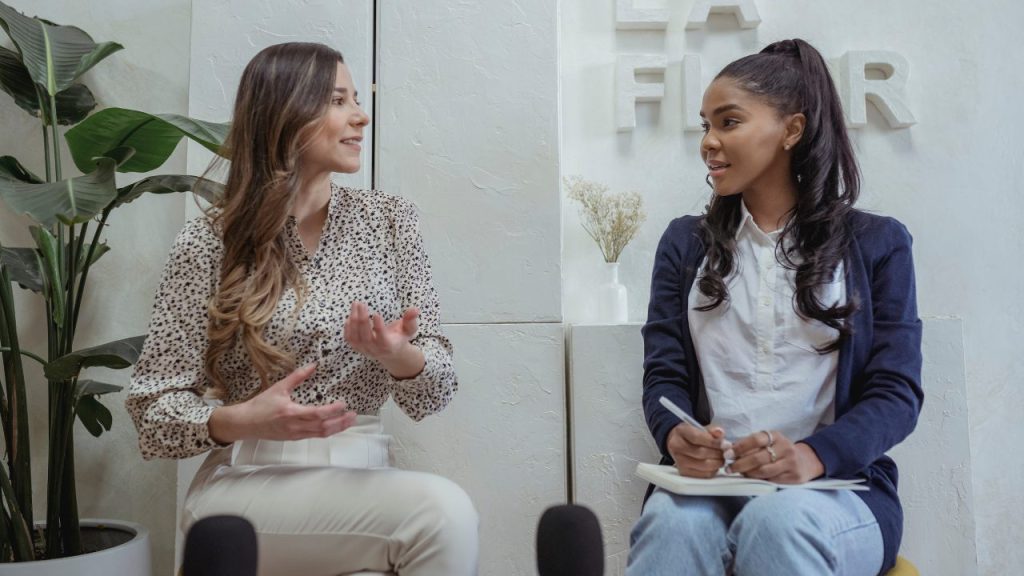You’ve done it. Landed an interview for your dream job. Time to prep and ace this thing, right? Sure, you need to brush up on your industry knowledge and practice answers to common questions.
But don’t forget the most important part of the interview: your body language. That’s right, all those nonverbal cues you don’t even realize you’re giving off. An ill-timed eye roll or slouch could tank your chances, no matter how perfect your qualifications.
So if you want that offer, it’s time to get your gestures, posture, and facial expressions interview-ready. The stakes are high, but nail this and you’ll have hiring managers eating out of the palm of your hand. Hopefully not literally, because that would be weird.
The Importance of Nonverbal Communication in Interviews

Your Body Talks Loud and Clear
Your body language during an interview speaks volumes about you, so make sure it’s saying the right things. Slouching in your seat like an apathetic teenager will convey that you can’t be bothered to care.
Leaning forward eagerly at every question may come across as desperate or obsequious. Find a relaxed yet engaged posture, make eye contact, and smile when appropriate. Your energy and enthusiasm for the role should shine through naturally.
Watch Those Hands!
How you gesture with your hands during an interview can be very revealing. Fidgeting nervously or waving your hands around wildly while talking will make you seem anxious and distracting.
Stiffly clasping your hands in your lap the entire time can appear rigid or closed-off. Practice active listening by nodding, using natural hand gestures to engage your listener, and unclasping your hands when speaking to help convey passion or make a point.
It’s Not What You Say, It’s How You Say It
Your tone, inflection, and the pace at which you speak also impart meaning. A flat, monotonous tone will bore your interviewer to tears, while an overly dramatic or aggressive tone may come across as insincere or abrasive.
Find a balance of animation and gravitas that lets your personality shine through while staying professional. Speak clearly and with enthusiasm, vary your pitch for emphasis, and don’t be afraid of short pauses – they give your words more weight and allow you to gather your thoughts before responding.
The job interview is a multifaceted exchange of information, and while your skills and experience are important, how you present yourself nonverbally is equally critical. With mindful practice of positive body language, hand gestures, tone, and pacing, you’ll have a winning combination to ace your next interview.
How to Prepare for Common Interview Questions

As if job interviews aren’t awkward enough, hiring managers love throwing curveball questions at you to see how you react under pressure. You’ll want to prepare for the usual suspects like “Tell me about yourself” (not your life story) and “Why are you leaving your current job?” (never trash talk your boss). But it’s the weird ones that’ll trip you up.
Those HR sadists will ask things like:
- “If you were an animal, what would you be?” Just pick an animal that matches your “personal brand” and move on. No need to mention your spirit animal is a honey badger.
- “Where do you see yourself in five years?” The correct answer is not “hopefully still employed.” Talk about career growth and new responsibilities, even if your real five-year plan is to win the lottery.
- “What’s your biggest weakness?” This is a trap. Don’t actually tell them your biggest weakness or, worse yet, claim you have none. Discuss a minor flaw that you’re working to improve, like learning to delegate more or strengthening your public speaking skills.
The key is to prepare without sounding like a robot. Have a friendly, enthusiastic demeanor and share relevant experiences that prove you’re a great culture fit. Drop in some humor and stories to show your personality.
With the right balance of preparation and authenticity, you’ll nail even the most ridiculous interview questions. If all else fails, compliment the interviewer’s choice of animal – that otter mug is adorable! Maybe you’ll get the job on cuteness alone.
Dress for Success: Tips on What to Wear to an Interview

You’ve aced the phone screen and now it’s time for the main event—the in-person interview. While your charming personality and brilliant answers will hopefully seal the deal, your outfit also speaks volumes. Since first impressions can’t be redone, here are some pro tips to ensure your attire gives you a competitive edge:
Lose the denim.
Unless you’re interviewing at a Silicon Valley startup, leave those jeans at home. Opt for professional slacks or a skirt in navy, gray, or black. While you’re at it, ditch the t-shirt and sneakers too. You can rock that look on the weekends.
Power suit or no?
A full suit can seem over-the-top for some roles, while for others it’s expected. Do some LinkedIn stalking to see what current employees typically wear. If still unsure, a jacket and slacks/skirt is a safe bet. Save louder colors and patterns for the weekends—stick to solids in navy, charcoal gray, or black.
The devil’s in the details.
Polish up those shoes until you can see your face in them. Get a fresh haircut and style your hair neatly. Well-groomed facial hair or clean-shaven? Your call. Just commit to a tidy appearance. Press your shirt and ensure your outfit is wrinkle-free. These little touches demonstrate you pay attention to detail.
Keep accessories minimal.
Limit jewelry to simple, minimal pieces. Skip the baseball cap and leave your backpack at home. You’re going for professional, not casual.
Check yourself before you wreck yourself.
Give yourself a once-over in a full-length mirror before heading out the door. Make sure your clothes are fitted properly and everything is tucked in and buttoned up. Do a quick stain check—there’s no recovery from a visible coffee stain or unraveled hem during an interview.
Nailing the perfect interview outfit gives you confidence and one less thing to worry about. Now you can focus on dazzling them with your smile, firm handshake, and brilliant answers to their questions. You’ve got this! Go get ‘em, tiger!
Interview Etiquette 101: Mind Your Manners

So you’ve scored an interview for your dream job. Congrats! Now comes the tricky part—actually showing up and impressing your hopefully future boss. While you may have the perfect resume and work experience, if you haven’t mastered some basic interview etiquette, you can kiss that offer goodbye.
Sit up straight and smile, for crying out loud!
Slouching in your chair like a moody teen will not win you any points. Nor will avoiding eye contact and grimacing like you have a stomach ache. Sit up, uncross your arms, make eye contact, and flash those pearly whites. Appearing open, engaged, and enthusiastic can make up for any nerves you may have.
Watch your mouth
We’re not talking about cursing here, we’re talking about how you physically handle that magnificent orifice on your face. Don’t chew gum (ever), yawn openly, or do anything else weird with your mouth. Keep your lips closed when listening. And for the love of all that is holy, do not pick or lick your lips. Have a breath mint before the interview in case of close talking.
Keep your hands to yourself
Do not touch your hair, face, or anywhere else repeatedly. It signals discomfort, boredom or dishonesty. Crossing your arms is also a no-no. Keep hands in your lap or at your sides. Use natural, subtle hand gestures to engage your listener as you speak. But don’t overdo it with the theatrics. You’re not auditioning for the next Marvel movie.
Watch the clock
While you never want to appear rushed, you don’t want to overstay your welcome either. Most interviews last 30-60 minutes. Be very aware of the time and have a polite exit strategy ready around the 45-minute mark.
Graciously ask about the next steps in the process, reiterate your interest, and make your departure. You want to leave while the conversation is still flowing, with a smile, handshake and perhaps plans to continue the dialogue.
Practice Makes Perfect: Ways to Rehearse for an Interview
Interview prep is the difference between landing the job and sulking home with a bruised ego. Sure, you’ve memorized some canned answers and Googled the typical questions, but that won’t save you if you freeze up like a deer in headlights. The only way to avoid interview stage fright is through practice.
Do a Mock Interview

Find a friend or family member and have them conduct a mock interview. Ask them to grill you with the tough questions while you do your best to respond professionally. The more you practice thinking on your feet, the more natural you’ll feel during the actual interview.
If no one wants to play interviewer, record yourself on video and critique your own performance. Look for any “um’s,” fidgeting, or rambling that needs improvement.
Research Common Questions
While you can’t predict every question, you can prepare for the most common ones. Have examples ready for questions like “Tell me about yourself,” “Why are you leaving your current job,” and “Why should we hire you.” Practice your answers out loud, not just in your head. Verbalizing your responses helps commit them to memory and exposes any areas that need polish.
Review Your Resume
Know your resume inside and out, because the interviewer certainly will. Be ready to provide specific examples and stories to illustrate your key accomplishments and career highlights. without regurgitating what’s already on the page. Refresh yourself on dates, key responsibilities, and metrics that will allow you to speak about your experience with confidence.
Dress for Success
While it won’t directly impact your interview performance, dressing professionally will put you in the right mindset. Do a trial run of your outfit a few days before to ensure it’s comfortable, wrinkle-free and appropriate for the company culture. You’ll feel more self-assured and ready to conquer any question that comes your way.
With practice, your pre-interview jitters will transform into enthusiastic energy. You’ll walk in equipped with well-rehearsed answers and the poise of a pro, ready to dazzle your interviewer and land the job of your dreams. Now get out there and start practicing!
Make a Great First Impression With Strong Handshakes and Eye Contact
So, you’ve scored an interview for your dream job. Congrats! Now comes the tricky part—actually impressing your interviewer in person. Sure, you’ve got a stellar resume and work experience, but if you come across a limp noodle or stare at the floor the whole time, you can kiss that offer goodbye.
Firm Handshakes Show Confidence
A handshake is your first introduction, so make it count. Limp, sweaty handshakes are for the meek. Look your interviewer in the eye, flash a friendly smile, and give a firm, enthusiastic shake. Not too hard, we don’t want to break any fingers here. Just grasp their hand confidently for a couple of seconds. Release, say “It’s a pleasure to meet you,” and you’re golden.
Maintain Eye Contact (But Don’t Stare)
Prolonged eye contact shows you’re engaged and interested, while darting eyes signal discomfort or shiftiness. So find a happy medium. Make eye contact when listening and speaking, but glance away occasionally, like you would in normal conversation.
Staring without a break can seem aggressive or make people uneasy. A good rule of thumb is to make eye contact for 3 to 5 seconds at a time before glancing away.
Sit Up Straight! Slouching is for Slackers
Your posture speaks volumes about your enthusiasm and confidence. Sit up straight with your shoulders back to appear alert and engaged. Slouching, slumping, or crossing your arms makes you seem disinterested or closed off.
If sitting, keep your feet planted on the floor. If standing, stand up straight and avoid swaying or fidgeting. Looking professional and self-assured, even if you’re a nervous wreck on the inside, can go a long way in impressing your interviewer.
With the right handshake, eye contact, and posture, you’ll have achieved that first impression in no time. The rest is up to your skills and experience—which you have in spades, right? You’ve got this!
Read Your Audience: Tips on Interpreting an Interviewer’s Body Language
So you’ve prepped for days, picked out a stellar outfit, and psyched yourself up for your big interview. But have you thought about what your interviewer’s body language might reveal? Their physical cues can give you insight into how the interview is really going and help you adapt on the fly.

When an interviewer leans forward, makes eye contact, and has an open and relaxed posture, it means they’re engaged and interested in what you’re saying. This is your cue to turn on the charm! Crack a smile, make eye contact, and speak enthusiastically about your relevant experience.
But be careful not to get too comfortable, you’re not out of the hot seat yet. If an interviewer furrows their brow, crosses their arms, or jiggles their leg, they may be skeptical or concerned about something.
Tread lightly and be prepared to address any objections. You may need to reiterate your qualifications or provide a clarifying example. Stay calm and composed, getting defensive will only make the situation more awkward.
An interviewer who frequently checks the time or glances at their phone is likely distracted or unimpressed. In this case, you need to grab their attention and sell yourself! Share an eye-catching story or achievement and really drive home why you’re the perfect candidate.
If you continue to sense a lack of interest, you may need to face the harsh reality that this role probably isn’t the right fit. But keep your head high, there are more interviews out there!
While an interviewer’s body language can provide clues to help navigate the conversation, don’t read into things too much. Ultimately, you have no way of knowing what personal issue or deadline might be distracting them that day.
Stay focused on highlighting your relevant experience, skills, and enthusiasm for the work. That’s the surest way to ace any interview, no matter what signals the interviewer sends. You’ve got this! Now go dazzle them.
Stay Calm and Confident During an Interview
So you’ve scored an interview—congrats! Now comes the tricky part: not freaking out. It’s normal to feel nervous, but take a few deep breaths and remember, you’ve got this. The hiring manager already likes your resume, otherwise you wouldn’t be here. Now’s your chance to show them the clever, charismatic person behind the CV.
When you walk in, make eye contact, flash a genuine smile, and give a firm handshake. Not too firm, you’re not trying to break fingers here. Find the sweet spot that says ‘confident but not overbearing.’ Take your seat, sit up straight, and try to appear open and engaged. Crossing your arms or slouching will make you seem closed off or disinterested.
As the questions start coming, don’t panic if you don’t have an immediate answer. It’s OK to think before you respond. Repeat or rephrase the question out loud, then address it thoughtfully and honestly. If you get stumped, ask for clarification. There’s nothing wrong with saying you need a moment to think.

Whatever you do, avoid ‘um’s,’ fidgeting, or breaking eye contact. These tics can seem distracting and signal that you’re uncomfortable. The interviewer wants to see that you can handle pressure and think on your feet. Take a breath and gather your thoughts before responding.
When it’s your turn to ask questions, have some ready that show your enthusiasm and preparation. But don’t overdo it and interrogate the interviewer. Keep things friendly and casual. Close on an upbeat note, reiterate your interest in the role, and thank them for their time.
With the right mindset, you’ll do great. The confidence and poise you demonstrate can set you apart from other candidates. Even if you don’t get the job, use it as an opportunity to improve for the next one. Every interview is a chance to refine your technique and get closer to finding the right match. Stay positive, you’ve got this!
Conclusion
So listen up, buttercup. If you want that dream job, get your body in tune with your mind. Show up looking sharp, sit up straight, lean in with interest, and nod along to build rapport. Throw in a few smiles and open gestures to come across as warm and confident.
You may know your stuff backward and forwards, but if your body’s sending mixed signals, no one’s buying what you’re selling. Time to turn up the charm, exude professionalism through your pores, and dazzle ‘em with your winning personality.
Give this advice a shot and you’ll have recruiters eating out of the palm of your hand in no time. Now get out there, ace that interview, and go make some money, honey. The sky’s the limit!
Read More : 7 Work From Home Jobs No Experience and Immediate Start
 Oko Dot All In One Technology Solutions By Likhon Hussain
Oko Dot All In One Technology Solutions By Likhon Hussain
